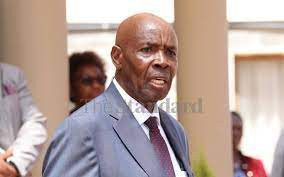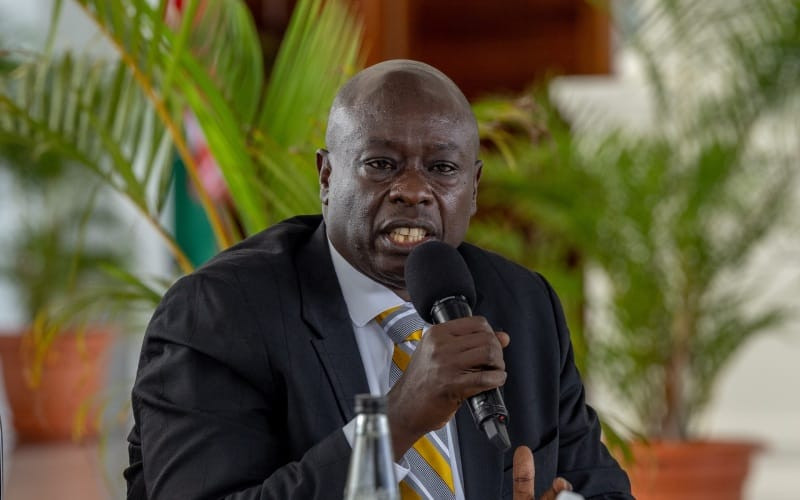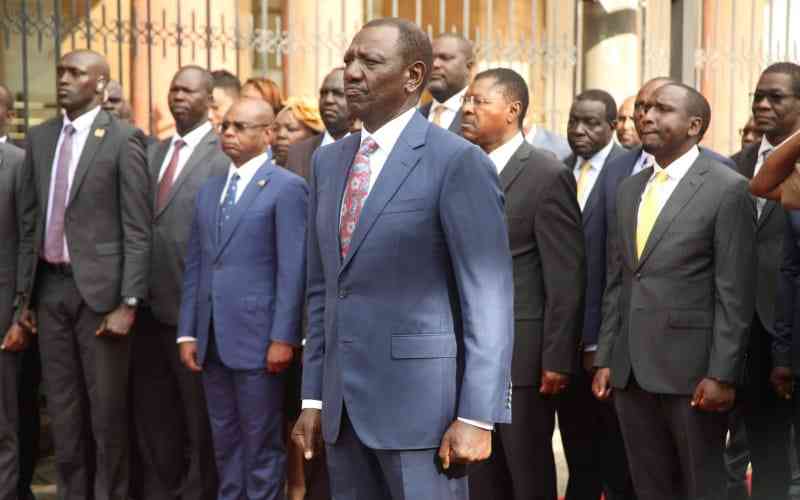 |
|
David Mwiria [PHOTO: STANDARD/FILE] |
By Macharia Kamau
Kenya: In his first year as Finance minister, David Mwiraria must have had many peaceful nights. During the 2003/2004 financial year, revenue collections by the Kenya Revenue Authority matched government expenditure.
This means that Mwiraria, Kibaki’s first Finance minister, did not have the headache of looking for alternatives to finance his Sh240 billion 2003/04 budget, with KRA collections hitting Sh229 billion and the deficit of Sh11 billion easily bridged by grants to the government.
It is then that the country bragged that it was fully financing its budget and in both subtle and explicit terms, told off some development partners.
But times of surplus and bliss at the Treasury lasted just a year before sleepless nights kicked in for Mwiraria and his successors at the public purse holder. Since the 2003/2004 financial year, the gap between revenue collections and expenditure has been widening.
In the 2012/13 financial year, KRA collected Sh800 billion, against a budget of Sh1.45 trillion, the deficit of which is bridged through loans. This financial year, KRA expects to collect Sh973 billion, while the government is working with a Sh1.6 trillion budget.
At the heart of the disparity between revenues and government spending has seen the public sector wage bill doubled in just five years between 2007 and 2012.
This year, salaries and allowances paid to government employees are expected to be over Sh500 billion, compared to Sh240 billion in 2008/09. At half a trillion, the spending on salaries this year will translate to over 50 per cent of the Sh973 billion that KRA expects to collect in tax revenues.
“Kenya’s public service wage bill has been steadily increasing over the past decades. However the most significant increases have occurred over the past five years,” says the Transition Authority in a recent position paper.
The Ministry of Devolution and Planning notes that the wage bill will continue to be a source of budgetary pressure in the coming years, as the country continues to implement the devolved structure of government.
Budgetary presure
“In the medium term, the country could face various budgetary pressures which could constrain the existing fiscal space. Sources of budgetary pressure include pressure from the implementation of the Constitution, current devolved system of government which creates additional administrative structures and new constitutional offices,” said the ministry in an October 2013 Public Expenditure Review.
The Jubilee Government has been laying foundation for a number of mega projects it plans to implement over the next four years.
These include the Standard Gauge Railway, the new terminal at the Jomo Kenyatta International Airport, the Galana irrigation project and adding 5,000 megawatts of electricity.
The Devolution and Planning Ministry said the government planned to heavily spend on infrastructure, a move expected to spur the economy as well as improve the country’s doing business position. Spending on infrastructure might be strained by the heavy recurrent expenditure.
Stay informed. Subscribe to our newsletter
Vision 2030
“The budget outlook in medium term policy commitment is to increase resources for development spending to invest in the capital stock, especially roads, and energy, in line with the Vision 2030 goals for laying the foundations for future economic growth,” said the ministry in the Public Expenditure Review.
However, a heavy recurrent expenditure, blown out of proportion by the high public sector wage bill, might come in the way of heavy spending on infrastructure or force the government to rely heavily on debt to finance infrastructure development.
The government expects to partly bridge the deficit of a Sh255 billion funding gap in infrastructure through tapping into private sector financing.
The National Treasury, through the recently set up Public Private Partnership Unit, has identified 47 projects that it plans to partner with the private sector in implementing them.
The economy is estimated to have grown five per cent in 2013 and the government expects to keep up the momentum and reach 6 per cent this year and 7 per cent in 2015. In the initial five years of the Kibaki administration, the economy grew at an average of 5.3 per cent, peaking at 7 per cent in 2007.
This was however disrupted by the post-election violence in late 2007 and early 2008, with the country having to almost start from scratch, growing on average at 3.9 per cent between 2007 and 2012.
 The Standard Group Plc is a
multi-media organization with investments in media platforms spanning newspaper
print operations, television, radio broadcasting, digital and online services. The
Standard Group is recognized as a leading multi-media house in Kenya with a key
influence in matters of national and international interest.
The Standard Group Plc is a
multi-media organization with investments in media platforms spanning newspaper
print operations, television, radio broadcasting, digital and online services. The
Standard Group is recognized as a leading multi-media house in Kenya with a key
influence in matters of national and international interest.
 The Standard Group Plc is a
multi-media organization with investments in media platforms spanning newspaper
print operations, television, radio broadcasting, digital and online services. The
Standard Group is recognized as a leading multi-media house in Kenya with a key
influence in matters of national and international interest.
The Standard Group Plc is a
multi-media organization with investments in media platforms spanning newspaper
print operations, television, radio broadcasting, digital and online services. The
Standard Group is recognized as a leading multi-media house in Kenya with a key
influence in matters of national and international interest.










